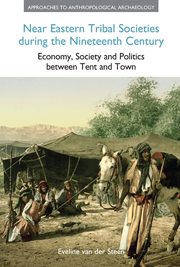 Near Eastern Tribal Societies during the Nineteenth Century
Near Eastern Tribal Societies during the Nineteenth Century The belief in God has often been advanced as not only the greatest, but the most complete of all the distinctions between man and the lower animals. It is however impossible, as we have seen, to maintain that this belief is innate or instinctive in man. On the other hand a belief in all-pervading spiritual agencies seems to be universal; and apparently follows from a considerable advance in man's reason, and from a still greater advance in his faculties of imagination, curiosity and wonder.
(Charles Darwin, The Descent of Man, 1871)Introduction
Religion seems to have played a more important role in the observations of the various nineteenth-century travellers than it did in most of the tribal societies they encountered. The main observation was that Bedouin were, on the whole, not very religious and that they had only a vague concept of what their religion entailed. The dividing line between religion and folklore was blurred in most societies. Folklore, ancient rituals and the concept of sacred space blended in with the daily life of every tribe and played an important role in their daily actions. Because of this, efforts by Wahabi theologians to root out these ancient customs together with modern vices were largely unsuccessful.
To save this book to your Kindle, first ensure [email protected] is added to your Approved Personal Document E-mail List under your Personal Document Settings on the Manage Your Content and Devices page of your Amazon account. Then enter the ‘name’ part of your Kindle email address below. Find out more about saving to your Kindle.
Note you can select to save to either the @free.kindle.com or @kindle.com variations. ‘@free.kindle.com’ emails are free but can only be saved to your device when it is connected to wi-fi. ‘@kindle.com’ emails can be delivered even when you are not connected to wi-fi, but note that service fees apply.
Find out more about the Kindle Personal Document Service.
To save content items to your account, please confirm that you agree to abide by our usage policies. If this is the first time you use this feature, you will be asked to authorise Cambridge Core to connect with your account. Find out more about saving content to Dropbox.
To save content items to your account, please confirm that you agree to abide by our usage policies. If this is the first time you use this feature, you will be asked to authorise Cambridge Core to connect with your account. Find out more about saving content to Google Drive.